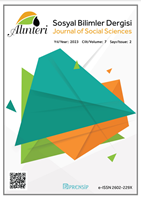Federal Almanya Cumhuriyeti’nin 11 Eylül Terör Saldırıları Sonrasındaki Dış Politikasının, Koalisyon Hükûmetleri (1998-2005) ve Hükûmet Çalışmaları Bağlamında Analizi
Analysis of the Foreign Policy of the Federal Republic of Germany After the September 11 Terrorist Attacks in the Context of Coalition Governments (1998-2005) and Government Work
Author(s): Bedri Şahin, Güngör GökdağSubject(s): Political history, Social history, International relations/trade, Social Theory, Present Times (2010 - today), Sociology of Politics
Published by: Kastamonu Üniversitesi
Keywords: Federal Republic of Germany; September 11 Terrorist Attacks; Coalition Governments; Foreign Policy Approach;
Summary/Abstract: Developments that shape global relations and have an impact on an international scale differentiate the work/strategies of countries. In particular, the increasing importance of bilateral relations has necessitated examining the factors that shape foreign policy. In this respect, the September 11 Terrorist Attacks also showed their effect in this direction. Countries supported United States of America (USA) with the decisions they made. The issues in which USA’s strategies dominate have also affected other countries; It had a particularly strong impact on Germany. One explanation for this situation is that the permissions given to use airspace were granted during the Iraq War. Additionally, there have been changes and transformation efforts in some strategies; Germany-NATO relations increased after the Cold War. However, after the September 11 Terrorist Attacks, these relations decreased and America-Transatlantic relations began. During this period, Germany also focused on proving its strength to USA and providing competence in the European Union Federation. Especially the analyzes based on the Schröder/Fischer coalition government theses are important. However, the fact that the views of Schröder and Fischer were not always complementary to each other caused conflicts to occur both in this dimension and in the coalition. In this context, it is seen that Germany is turning to new strategies, and from realist policies to neorealism. In this respect, it cannot be limited to military/security issues; It is important to have studies that develop strategies depending on factors such as economic and social. The most obvious example is the decisions taken regarding Eastern expansion. In this article, attitudes and policies towards developments are examined within the framework of issues such as decisions taken in this direction and disagreements.
Journal: Alınteri Sosyal Bilimler Dergisi
- Issue Year: 7/2023
- Issue No: 2
- Page Range: 139-153
- Page Count: 15
- Language: Turkish

